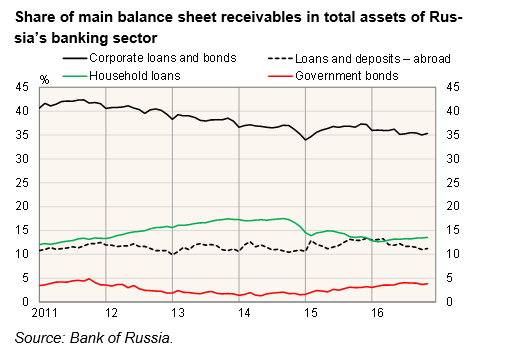BOFIT Weekly Review 49/2016
Growth of Russia’s banking sector has stalled
Household deposits held by banks increased at a brisk pace last year and the early months of 2016. More recently, however, the stream of household deposits to banks has subsided. A more striking change has been the unusually rapid draining of corporate bank accounts over the past six months. As a result, growth of banking sector total assets this year has come to an exceptional standstill. In addition, the value of forex-denominated items converted to rubles and thereby the balance sheet total in rubles has shrunk considerably with the ruble’s appreciation.
The growth in receivables on the banking sector balance sheet has been limited by weakness of lending, especially corporate lending. The stock of domestic corporate loans granted by banks has shrunk considerably this year. Part of this is due to ruble appreciation, but another equally large reason is that the corporate sector has paid down bank loans faster than it has taken new loans. The drop in corporate borrowing from banks has been slightly offset by banks increasingly acquiring corporate bonds. In contrast, borrowing of Russian households has recovered a bit this year, even if households have been cautious about new borrowing compared to the pre-recession period from 2011 to 2014.
The modest borrowing of the private sector has created an opportunity at least for the time being for the government to fund part of the federal budget deficit through the sale of bonds to domestic banks. If private borrowing does not recover significantly, the state should have no great difficulty in increasing domestic borrowing under the budget deficit financing plan as presented.
Bank receivables from companies based abroad, as well as from non-resident banks and foreign governments have declined this year. In addition to ruble appreciation, banks in Russia have reduced their deposits in foreign banks.
